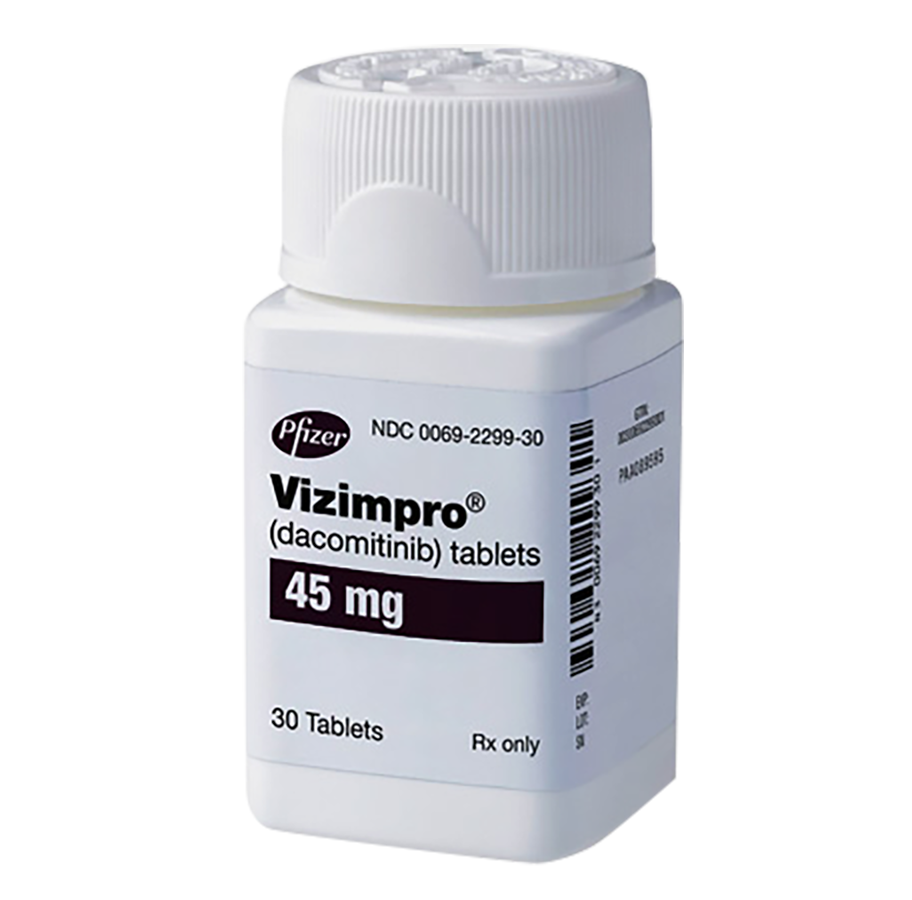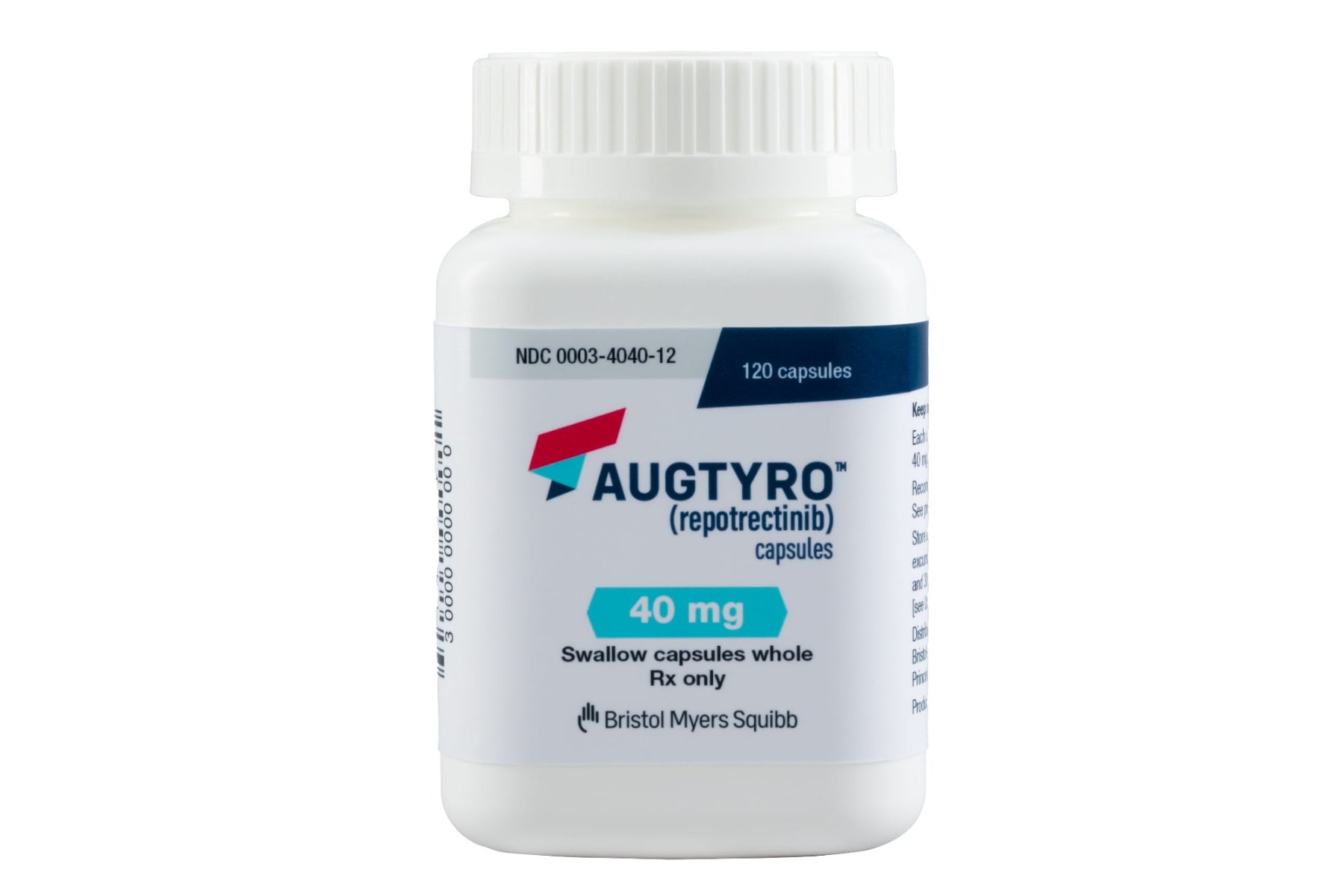Vizimpro (dacomitinib) vs Augtyro (repotrectinib)
Vizimpro (dacomitinib) vs Augtyro (repotrectinib)
When comparing Vizimpro (dacomitinib) with Augtyro (repotrectinib), it is important to note that both are targeted therapies for cancer, but they are used to treat different types of mutations. Vizimpro is a pan-human epidermal growth factor receptor (HER) tyrosine kinase inhibitor indicated for the first-line treatment of patients with metastatic non-small cell lung cancer (NSCLC) with epidermal growth factor receptor (EGFR) exon 19 deletion or exon 21 L858R substitution mutations. On the other hand, Augtyro (repotrectinib) is designed to target ROS1, NTRK1-3, and ALK gene rearrangements, and is being investigated for use in patients with advanced solid tumors harboring these specific genetic alterations; however, as of the knowledge cutoff date in 2023, Augtyro may not yet be approved for clinical use and is subject to ongoing clinical trials. Patients should consult with their healthcare provider to determine the most appropriate medication based on their specific genetic tumor profile and the current approval status of these medications.
Difference between Vizimpro and Augtyro
| Metric | Vizimpro (dacomitinib) | Augtyro (repotrectinib) |
|---|---|---|
| Generic name | Dacomitinib | Repotrectinib |
| Indications | First-line treatment for patients with metastatic non-small cell lung cancer (NSCLC) with EGFR exon 19 deletion or exon 21 L858R mutation | Investigational for the treatment of advanced solid tumors with NTRK1/2/3, ROS1, or ALK gene fusions |
| Mechanism of action | Irreversible inhibitor of the epidermal growth factor receptor (EGFR) tyrosine kinase | Tyrosine kinase inhibitor targeting TRK, ROS1, and ALK fusions |
| Brand names | Vizimpro | Augtyro |
| Administrative route | Oral | Oral |
| Side effects | Diarrhea, rash, stomatitis, decreased appetite, nail effects, dry skin, decreased weight, alopecia | Not fully characterized; may include fatigue, constipation, dysgeusia, edema, dizziness, and anemia |
| Contraindications | None known specifically; caution in patients with interstitial lung disease and hepatotoxicity | Not fully characterized; likely similar to other tyrosine kinase inhibitors (e.g., hepatic impairment, QT prolongation) |
| Drug class | EGFR tyrosine kinase inhibitor | Tyrosine kinase inhibitor |
| Manufacturer | Pfizer | Turning Point Therapeutics |
Efficacy
Vizimpro (Dacomitinib) Efficacy in Lung Cancer
Vizimpro, with the active ingredient dacomitinib, is a kinase inhibitor specifically designed to target the epidermal growth factor receptor (EGFR) tyrosine kinase, which is known to play a critical role in the pathogenesis of certain types of lung cancer. The efficacy of Vizimpro was primarily established in a clinical trial that compared it to another EGFR inhibitor, gefitinib, in patients with locally advanced or metastatic non-small cell lung cancer (NSCLC) with EGFR exon 19 deletion or exon 21 L858R substitution mutations. Results demonstrated that patients treated with Vizimpro had a significantly longer progression-free survival compared to those treated with gefitinib, indicating that Vizimpro may be a more potent option for first-line treatment in this patient population.
It is important to note that Vizimpro's efficacy is contingent upon the presence of EGFR mutations, and it is not indicated for patients whose tumors harbor wild-type EGFR. The presence of these mutations should be confirmed by an FDA-approved test prior to starting treatment with Vizimpro. The drug's ability to improve overall survival is still being investigated, but the improvement in progression-free survival marks it as an important treatment option for EGFR-mutated NSCLC.
Augtyro (Repotrectinib) Efficacy in Lung Cancer
Augtyro, also known as repotrectinib, is an investigational, next-generation tyrosine kinase inhibitor targeting the tropomyosin receptor kinases (TRK), ROS1, and anaplastic lymphoma kinase (ALK). While the medication is still under clinical investigation and has not yet been approved by regulatory agencies, it has shown promise in early clinical trials for the treatment of lung cancer. Specifically, repotrectinib has demonstrated efficacy in patients with NSCLC who have ROS1 fusion or ALK rearrangement, which are genetic alterations that can drive tumor growth in a subset of lung cancer patients.
In early clinical trial results, repotrectinib has been shown to have robust antitumor activity in patients with ROS1-positive or ALK-positive NSCLC, including those who have developed resistance to prior ROS1 or ALK inhibitors. The drug's design allows it to overcome resistance mutations, providing a potential new treatment avenue for patients who have few remaining options. While further research is needed to fully establish the efficacy and safety profile of repotrectinib, the preliminary data suggest that it could become an important addition to the arsenal of targeted therapies for lung cancer.
Regulatory Agency Approvals
Vizimpro
-
European Medical Agency (EMA), European Union

-
Food and Drug Administration (FDA), USA

Augtyro
-
Food and Drug Administration (FDA), USA

Access Vizimpro or Augtyro today
If Vizimpro or Augtyro are not approved or available in your country (e.g. due to supply issues), you can access them via Everyone.org.
How it works

Make an enquiry
Choose the medicine you want to buy, answer a couple of questions, and upload your prescription to speed things up. We’ll get back to you within 24 hours.


Make an enquiry
Choose the medicine you want to buy, answer a couple of questions, and upload your prescription to speed things up. We’ll get back to you within 24 hours.


Breeze through the paperwork
We'll guide you through the required documents for importing unapproved medicine, ensuring you have all the necessary information.


Get a personalized quote
We’ll prepare a quote for you, including medicine costs and any shipping, administrative, or import fees that may apply.


Receive your medicine
Accept the quote and we’ll handle the rest - sourcing and safely delivering your medicine.

Some text on this page has been automatically generated. Speak to your physician before you start a new treatment or medication.
Let's talk
If you have any questions, call us or send us a message through WhatsApp or email:
Contact us




